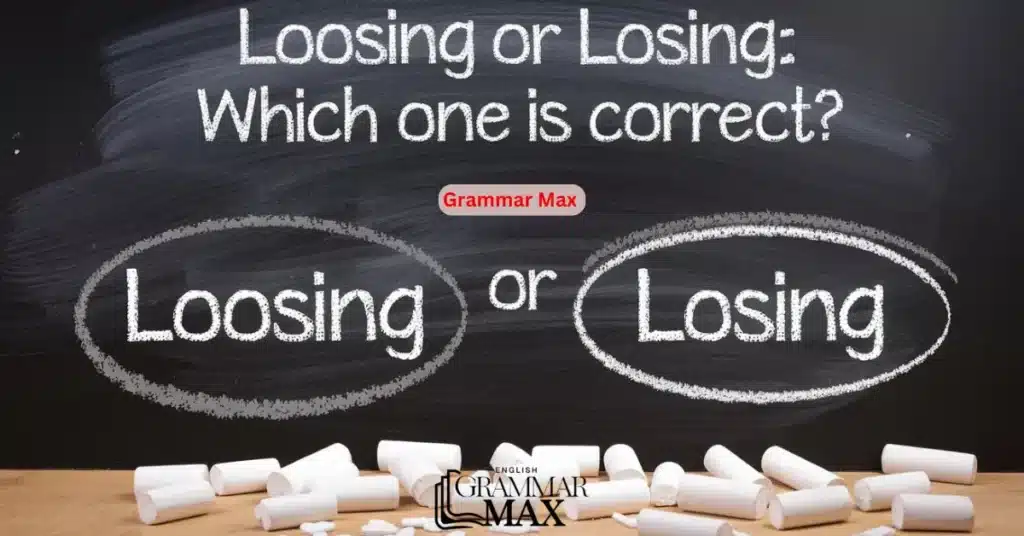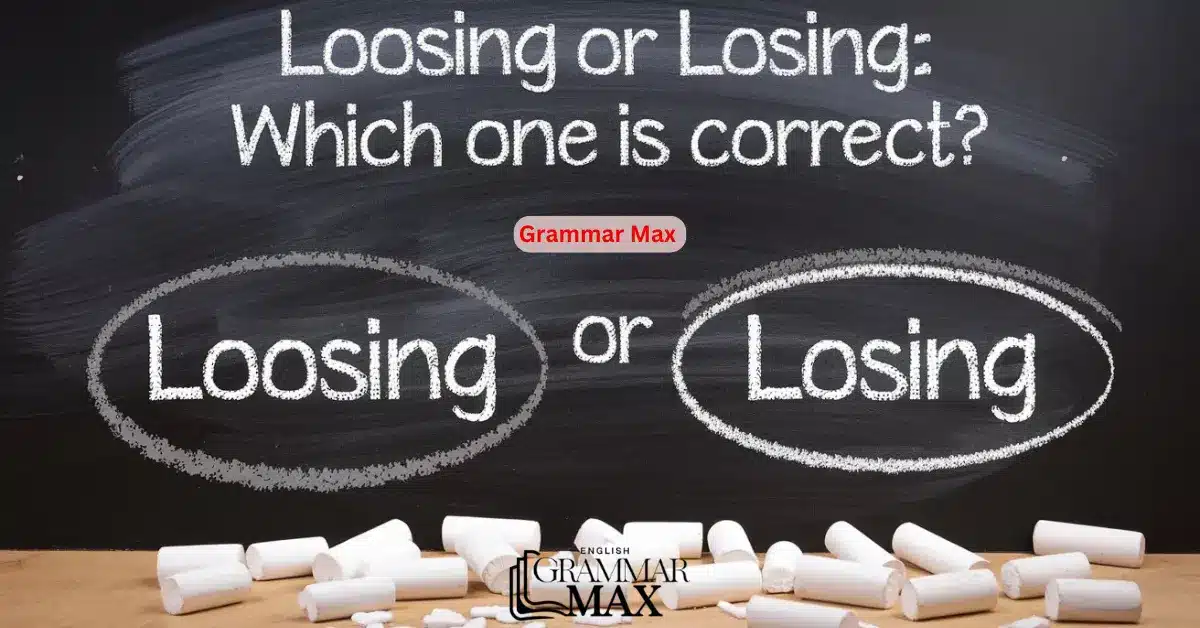Many people confuse Loosing and Losing. Discover 3 simple ways to remember the difference and use each word correctly in your writing.
What Is the Difference Between Loosing and Losing?
In this article, we will clear up the confusion by exploring the definitions and correct uses of “loosing” and “losing.” We will provide real-life examples and compare both words side by side. By the end of this post, you will confidently know when to use “loosing” and when to use “losing,” helping you avoid common mistakes in your writing.
Understanding Loosing Or Losing
To fully understand the difference between “loosing” and “losing,” it’s important to break down their meanings. Both words stem from the verb “lose,” but their spelling and uses differ based on context.
Loosing Or Losing EX
“Loosing” comes from the word “loose,” which means to release or untighten something. It’s much less common in everyday conversation but is still an important word to know, especially when discussing physical objects. On the other hand, “losing” is much more common and refers to misplacing something or failing at something, like losing a game. People tend to confuse the two because of their similar spelling and pronunciation, but in practice, they are used in very different ways.
Loosing: Definition and Usage
“Loosing” is the present participle form of the verb “loose,” meaning to make something less tight or to release it. You might use “loosing” when you talk about freeing something or letting go of something that is physically held in place. For example, “He was loosing the rope to allow the boat to drift.” In this case, “loosing” refers to the act of making the rope loose to set something free.
However, “loosing” is rarely used in modern speech or writing. It mainly appears in specific contexts like sailing, construction, or any situation where an object needs to be physically loosened. Many people mistakenly use “loosing” when they mean “losing,” which creates confusion because the two words serve very different purposes.
Losing: Definition and Usage
“Losing” is far more common in everyday English. It is the present participle of “lose,” which means to fail to retain possession of something or to be defeated in a competition. You might use “losing” when you misplace your keys or when your team doesn’t win a game. For instance, “She’s losing her patience with all the noise,” or “The team is losing the match.”
Unlike “loosing,” “losing” is a word you’ll use frequently, whether you’re talking about losing something physical, like an object, or losing in a non-physical sense, such as losing hope, time, or an opportunity. The key point to remember is that “losing” refers to a loss of some kind, while “loosing” is about making something less tight or releasing it.

Side-by-Side Comparison
The best way to solidify your understanding of “loosing” and “losing” is to compare them side by side. Below is a table showing their differences:
| Word | Meaning | Usage Example |
| Loosing | To make something loose or release | “He was loosing the sails before the storm.” |
| Losing | To misplace or be defeated | “We’re losing the game.” |
As you can see, loosing involves physically loosening something, while losing refers to failing or misplacing something. Misusing these words can completely change the meaning of your sentence, which is why it’s essential to know their differences.
Everyday Usage Examples
To ensure you fully grasp how to use “loosing” and “losing” in your writing, let’s look at some everyday examples.
Losing Examples:
- “I am losing my phone again.”
- “They are losing their chance to win the championship.”
- “He’s losing control of the situation.”
Loosing Examples:
- “The workers were loosing the bolts on the machinery.”
- “They were loosing the sails to catch more wind.”
- “She was loosing the dog from its leash.”
In these examples, you can clearly see the distinction between the two words. “Losing” relates to misplacing or failing, while “loosing” is all about making something less tight or letting it go.
DistinctionFrequently Asked Questions
Why do people confuse “loosing” and “losing”?
People often confuse these words because they sound very similar when spoken aloud and are only one letter apart. Additionally, fast typing and auto-correct can lead to unintended spelling mistakes, causing “loosing” to be used instead of “losing.”
Can “loosing” be used in everyday conversation?
While “loosing” is grammatically correct, it’s rarely used in casual speech. You are far more likely to encounter it in technical or specific contexts, like boating or mechanics, where objects are physically loosened. In most daily conversations, “losing” is the word you’ll use.
How can I remember the difference between “loosing” and “losing”?
A helpful way to remember the difference is to associate “loosing” with the word “loose,” which deals with making things less tight. On the other hand, think of “losing” as connected to loss or failure.
Conclusion
“loosing” and “losing” are two words that often get mixed up, but they serve different purposes. “Loosing” means to make something loose or free, while “losing” means to misplace something or fail to win. Remembering the difference between these words will help you avoid mistakes and improve the clarity of your writing. Use this guide as a reference whenever you’re unsure, and you’ll always pick the right word!

William Henry is a writer for Grammar Max, a blog that focuses on synonyms and phrases. He loves exploring the quirks of the English language and enjoys helping readers improve their vocabulary. William’s articles are easy to read, fun, and full of useful tips for anyone looking to better understand and use English. Whether you’re a student, a professional, or just someone interested in language, William’s writing on Grammar Max makes learning about words and their meanings simple and enjoyable.
